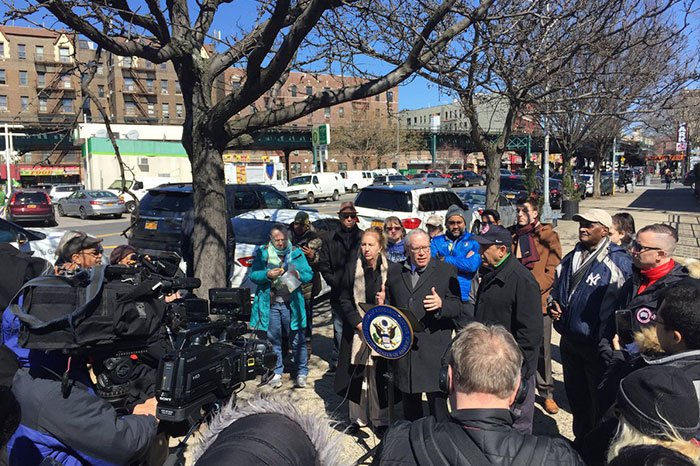Photo Courtesy of the City Comptroller’s Office
“These are heartbreaking government failures, because they affect young, vulnerable children,” Comptroller Stringer said.
By Forum Staff
“Massive” City Department of Education breakdowns could jeopardize the safety and welfare of the more than 33,000 homeless students enrolled in public schools in the five boroughs, according to an audit recently released by City Comptroller Scott Stringer.
According to NYC’s fiscal watchdog, among what he called the “systemic” failures, DOE fundamentally violates its own rules requiring outreach and follow-up efforts when homeless students are consistently absent from school without advance notice or late.
Stringer’s audit found:
• Where evidence of outreach efforts exists, DOE’s methods are woefully inadequate because DOE does not require that the outreach efforts involve actual interaction with parents;
• Instead, as the audit shows, the DOE considers automated calling systems — “robo-calls,” — as well as mailed “promotion-in-doubt” letters that do not consistently mention attendance issues, as “outreach efforts” for students with excessive unexcused absences, in lieu of actual contact with a child’s parent or guardian;
• For three students in the audit sample, with absences ranging from 17 to 51 days, the only evidence of any kind of outreach was a form letter that was dropped in the mail;
• A sample of 73 students spanned 96 different schools, and the Comptroller’s Office reviewed attendance plans, which under the Chancellor’s Regulations, are required to be developed by each school. Yet, the audit discovered that 90 out of 96 schools did not identify strategies for boosting attendance among students with chronic absences and did not delineate a process to update contact information for the students and their families; and
• DOE’s records of homeless students were so disorganized that the list it provided to the Comptroller of students residing in shelter during the 2015-2016 School Year was incorrect. Further analysis revealed that 15 of the 73 students randomly selected as a sample did not reside in shelter during that period.
The report also indicated, according to Stringer, that DOE has not demonstrated that its Family Assistants are making contact with the families whose children are chronically absent and late, specifically:
• DOE had no evidence that its Family Assistants conducted outreach for 1,357 – or 89 percent – of the 1,518 absences DOE recorded for the audit’s sample of 54 students who resided in shelters during the 2015-2016 School Year and were in need of intervention by a Family Assistant.
• For 29 of the 54 students in the audit sample with chronic attendance issues (54 percent), DOE Family Assistants made no outreach.
• The widespread Family Assistant outreach failures the audit uncovered are likely due, in large part, to insufficient staffing, Stringer noted. Specifically, during the 2015-2016 School Year, DOE employed only 110 Family Assistants to oversee 32,243 school-aged children residing in shelters—an average of 293 children per single Family Assistant.
In response to what he characterized as “alarming findings,” Stringer made no less than a dozen recommendations, including:
• DOE should enhance its procedures to ensure that school officials immediately make required outreach and intervention efforts when students are absent—and that those efforts are documented—in accordance with the Chancellor’s Regulations.
• DOE should ensure that its employees charged with oversight responsibilities for student attendance are familiar with their responsibilities.
• DOE should conduct a study to determine the appropriateness of its current caseloads for Family Assistants and whether its staffing levels are sufficient to enable them to effectively fulfill their job responsibilities.
According to the Comptroller’s Office, DOE “stated that it agreed with four of the 11 recommendations directed to the agency and partially agreed with another four.” However, the agency “expressly disagreed with a number of the audit findings. We address these areas of disagreement in detail in the body of this report. After carefully reviewing DOE’s arguments, we find no basis to alter any of the audit’s findings,” the Comptroller’s Office added.
“These are heartbreaking government failures, because they affect young, vulnerable children. Schools are like second homes to so many families across the five boroughs, but for homeless children, the classroom is sometimes their only source of stability. The DOE is failing these kids,” Stringer said. “But instead of admitting obvious breakdowns in supporting a challenging population of students, the bureaucracy believes in defending the indefensible, and claiming it’s getting the job done, contrary to all the evidence. It has to change – lives are at stake. We, as a City, are defined by how we support our most vulnerable. We need to be a school system that gives all children a chance to achieve their dreams. What we’ve shown in this audit is that the bureaucracy is letting kids down. The numbers here are deeply alarming, but behind each one of them is a vulnerable child who needs help from adults. Our kids deserve better.”

